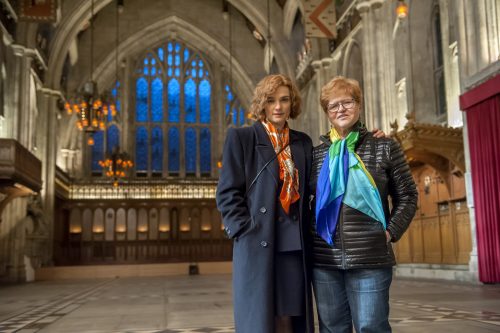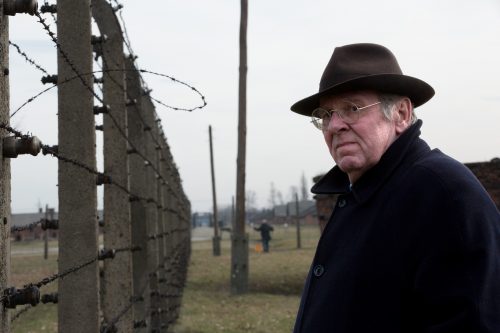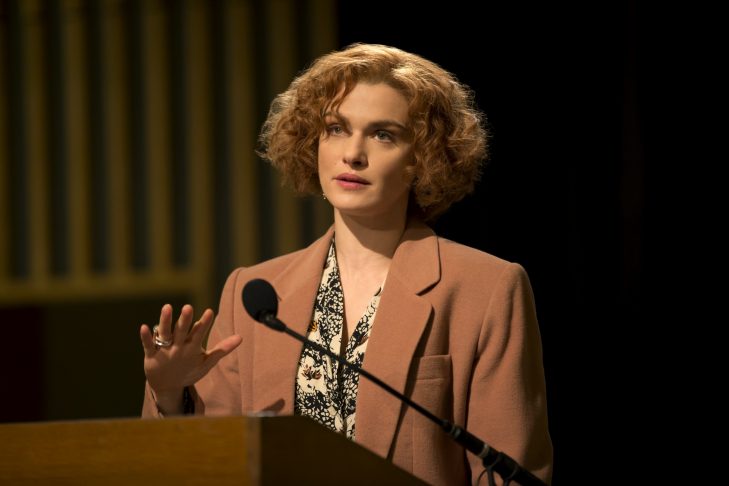Facts. Opinions. Lies. They can be manipulated until they are dangerously indistinguishable from one another. No one knows this more profoundly than Deborah Lipstadt, a professor of modern Jewish history and Holocaust studies at Emory University in Atlanta. Lipstadt’s expertise is Holocaust denial—a brand of anti-Semitism that posits the Holocaust never occurred, or even worse, has been overblown by a Jewish conspiracy.
Lipstadt and her work are given the Hollywood treatment in a new film aptly titled “Denial,” the story of her legal battle with David Irving, a well-known anti-Semite and bigot who sued her for libel in England. She was recently in Boston to talk about her work and the film, which opens in town Oct. 7, as well as to accept the Brandeis University Alumni Achievement Award. Lipstadt received her doctorate in Jewish history from Brandeis in 1976. And while she has been a recognized scholar of Holocaust history for decades, with the release of “Denial” she is poised to be recognized beyond academia. “It’s surreal,” Lipstadt told JewishBoston of her newfound fame. “I still haven’t quite absorbed it.”
Lipstadt’s surrealistic experience began well before Rachel Weisz was cast to play her. In 1993, Lipstadt published “Denying the Holocaust: The Growing Assault on Truth and Memory.” Although the book was well-received by her colleagues, it barely registered outside of the academy. All of that changed when David Irving, a prolific British writer and self-styled historian who specialized in the history of World War II, sued Lipstadt and her publisher for her characterization of him as “one of the most dangerous spokesmen in the service of Holocaust denial.” Lipstadt rightfully came to that conclusion after carefully studying Irving’s writings, which in part asserted that Hitler did not order the Nazi genocide of the Jews and that there were no gas chambers at Auschwitz. She was soon mired in a foreign legal system in which the burden of proof was on the defendant. In short, Lipstadt was presumed guilty until she could prove her innocence.

The case went to trial four years later in 2000. Her defense, brilliantly coordinated by Anthony Julius and Richard Rampton, who is played in the movie by Tom Wilkinson, hinged on the strategy that neither Lipstadt nor any Holocaust survivors testify. Initially, the move was another form of denial for Lipstadt. “The philosophy of the lawyers was: ‘You’re being sued for what you wrote and there is nothing you can add by going into the witness box. Irving will go on a fishing expedition—not that anybody expected him to find anything—but it will distract the judge,’” she explained. “I learned that this is standard operating procedure in British libel cases. And, anyway, why give him the nachas [joy] of being able to try and attack me?”
The playwright David Hare, who wrote the screenplay, concurred. In an article in The Guardian, he noted: “The decision was made that [Lipstadt’s] testimony would give Irving…the opportunity to switch the focus of the trial from what it should properly be about—the examination of how his antisemitism (sic) infected his honesty—to an attack on something entirely irrelevant: the reliability in the witness box of Lipstadt’s instant capacity to command every scattergun detail of history.”
For 10 weeks Lipstadt sat silently in the same courtroom as Irving, who acted as his own counsel. It was an experience she described as “eerie and very disconcerting.” “The hardest days,” she recalled, “were the days when we addressed anti-Semitism and racism because [Irving] took such glee in making fun of Jewish suffering, glee in making fun of people of color, glee in denigrating them.”

In one of the more affecting scenes in the film, Lipstadt and her legal team go to Auschwitz. “Rampton insisted on a forensic trip versus a memorial trip, and it was very difficult. I didn’t get what he was trying to do there,” she said. “Only afterward, when we went back to the hotel and he tells his wife [over the phone], ‘I’ve just come from the most terrible place on the earth,’ did I understand his [intentions].” At one point in the Auschwitz scene, Weisz, playing Lipstadt, recites the el malei rachamim—the traditional prayer of mourning. Lipstadt, who was on the set, recalls that it was a powerful moment for both her and the actress.
In April 2000 the English High Court ruled against Irving, and in the written decision the judge called Irving an anti-Semite and a bigot. Lipstadt chronicled the trial and her subsequent victory in a detailed memoir, “Denial: Holocaust History on Trial,” sections of which the movie faithfully adapts.
In our current political climate, the movie has particular relevance. “When we started to make this film, no one involved assumed it would have the contemporary resonance that it has,” Lipstadt said. “And I believe it goes way beyond the American presidential election. One of the takeaways of the film is something Daniel Patrick Moynihan is credited with having said: ‘You can have your own opinions, but not your own facts.’ A denier’s objective is to be thought of as presenting another side, but there are not two sides to this issue.”



